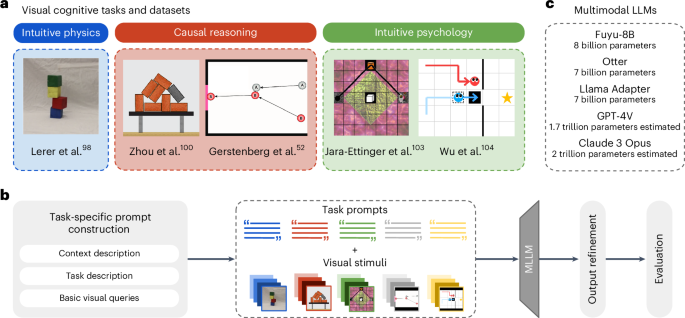Visual cognition in multimodal large language models
IF 18.8
1区 计算机科学
Q1 COMPUTER SCIENCE, ARTIFICIAL INTELLIGENCE
引用次数: 0
Abstract
A chief goal of artificial intelligence is to build machines that think like people. Yet it has been argued that deep neural network architectures fail to accomplish this. Researchers have asserted these models’ limitations in the domains of causal reasoning, intuitive physics and intuitive psychology. Yet recent advancements, namely the rise of large language models, particularly those designed for visual processing, have rekindled interest in the potential to emulate human-like cognitive abilities. This paper evaluates the current state of vision-based large language models in the domains of intuitive physics, causal reasoning and intuitive psychology. Through a series of controlled experiments, we investigate the extent to which these modern models grasp complex physical interactions, causal relationships and intuitive understanding of others’ preferences. Our findings reveal that, while some of these models demonstrate a notable proficiency in processing and interpreting visual data, they still fall short of human capabilities in these areas. Our results emphasize the need for integrating more robust mechanisms for understanding causality, physical dynamics and social cognition into modern-day, vision-based language models, and point out the importance of cognitively inspired benchmarks. Modern vision-based language models face challenges with complex physical interactions, causal reasoning and intuitive psychology. Schulze Buschoff and colleagues demonstrate that while some models exhibit proficient visual data processing capabilities, they fall short of human performance in these cognitive domains.


多模态大语言模型中的视觉认知
人工智能的一个主要目标是制造像人一样思考的机器。然而,有人认为深度神经网络架构无法做到这一点。研究人员断言,这些模型在因果推理、直觉物理学和直觉心理学领域存在局限性。然而,最近的进步,即大型语言模型的兴起,特别是那些为视觉处理而设计的语言模型,重新燃起了人们对模仿人类认知能力的兴趣。本文评价了基于视觉的大型语言模型在直觉物理学、因果推理和直觉心理学领域的发展现状。通过一系列的对照实验,我们研究了这些现代模型在多大程度上掌握了复杂的物理相互作用、因果关系和对他人偏好的直觉理解。我们的研究结果表明,虽然其中一些模型在处理和解释视觉数据方面表现出显著的熟练程度,但它们在这些领域的能力仍然低于人类。我们的研究结果强调需要将更强大的机制整合到现代的基于视觉的语言模型中,以理解因果关系、物理动力学和社会认知,并指出认知启发基准的重要性。
本文章由计算机程序翻译,如有差异,请以英文原文为准。
求助全文
约1分钟内获得全文
求助全文
来源期刊

Nature Machine Intelligence
Multiple-
CiteScore
36.90
自引率
2.10%
发文量
127
期刊介绍:
Nature Machine Intelligence is a distinguished publication that presents original research and reviews on various topics in machine learning, robotics, and AI. Our focus extends beyond these fields, exploring their profound impact on other scientific disciplines, as well as societal and industrial aspects. We recognize limitless possibilities wherein machine intelligence can augment human capabilities and knowledge in domains like scientific exploration, healthcare, medical diagnostics, and the creation of safe and sustainable cities, transportation, and agriculture. Simultaneously, we acknowledge the emergence of ethical, social, and legal concerns due to the rapid pace of advancements.
To foster interdisciplinary discussions on these far-reaching implications, Nature Machine Intelligence serves as a platform for dialogue facilitated through Comments, News Features, News & Views articles, and Correspondence. Our goal is to encourage a comprehensive examination of these subjects.
Similar to all Nature-branded journals, Nature Machine Intelligence operates under the guidance of a team of skilled editors. We adhere to a fair and rigorous peer-review process, ensuring high standards of copy-editing and production, swift publication, and editorial independence.
 求助内容:
求助内容: 应助结果提醒方式:
应助结果提醒方式:


